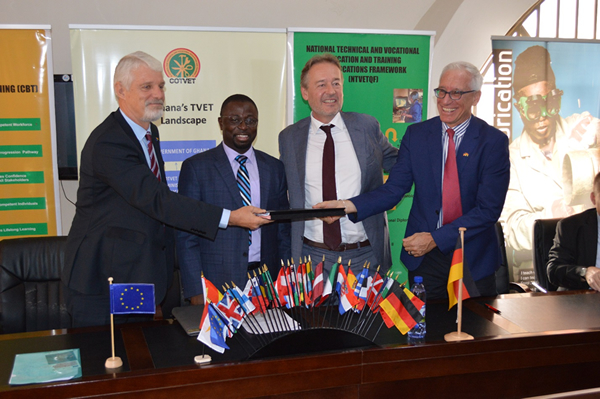 The European Union and Germany join their efforts in supporting skills development for youth in Ghana. The co-financing agreement between the European Union (EU) and the Deutsche Gesellschaft für Internationale Zusammenarbeit (GIZ) GmbH has been signed at a ceremony at the Council for Technical and Vocational Education and Training (COTVET). Implemented by German GIZ in cooperation with COTVET, the Ghana Skills Development Initiative seeks to improve the quality of the traditional apprenticeship system in the informal sector.
The European Union and Germany join their efforts in supporting skills development for youth in Ghana. The co-financing agreement between the European Union (EU) and the Deutsche Gesellschaft für Internationale Zusammenarbeit (GIZ) GmbH has been signed at a ceremony at the Council for Technical and Vocational Education and Training (COTVET). Implemented by German GIZ in cooperation with COTVET, the Ghana Skills Development Initiative seeks to improve the quality of the traditional apprenticeship system in the informal sector.
The third phase of the Initiative started in April 2016 The total amount of the Ghana Skills Development Initiative III is EUR 10.769 Mio., of which the EU contribution is EUR 7 Mio. The German Contribution is part of a wider Programme for Sustainable Economic Development (PSED), financed so far with EUR 11.1 Mio. by the German Federal Ministry for Economic Cooperation and Development.
The ceremony was attended by H. E Christoph Retzlaff, the Ambassador of the Federal Republic of Germany to Ghana, H.E. William Hanna, the Ambassador of the European Union to Ghana, Dr. Fred Asamoah, the Executive Director of COTVET, Alan Walsch, the Country Director of GIZ, and other GSDI partners.
The project supports the introduction of competency based training which is industry-led and demand driven. It is an outcomes based model that is collaborative in its delivery and anchored on occupational standards. It combines both workplace-based training in the informal sector and school-based training modules at selected TVET training providers. “The strengths of the German approach were adapted to the Ghanaian context” stated the German Ambassador during his speech, while adding “We appreciate that the EU Delegation decided to co-finance the Ghana Skills Development Initiative.”
The Executive Director of COTVET highlighted that German Development Cooperation has been providing support to the TVET sector over the last five years. Since 2012, a total of 16 training providers and 10 trade associations cooperated in the implementation of the cooperative apprenticeship training for 232 apprentices and 232 master crafts persons in 3 regions and in 5 trade areas in Ghana.
In March 2016, 188 apprentices (81%) were certified on the National TVET Qualifications Framework and successfully achieved their assessment and received a nationally recognized National Proficiency I certificate. The National TVET Qualifications Framework is the standardized structure for the award of certificates in the TVET sector. “We are working together to ensure the successful roll –out of the developed approach with the Ghana TVET Voucher Programme funded by the German development Bank, KfW, to reach thousands of master craftspersons and apprentices of the informal sector. This will lead to skills upgrade for our youth and subsequently enhance their livelihoods” the Executive Director stated.
The Ghana Skills Development Initiative III will now expand to 3 additional trade areas and 2 agricultural value chains. It will also reach out to 3 additional regions – amongst them the Ashanti Region. The new financial support from the EU will contribute to this upscaling. “Today is the beginning of a new partnership between Ghana and the European Union in the area of skills development. Working together we are investing in youth.” said the EU Ambassador.























